

The Statement of Purpose or SoP (a.k.a Statement of Intent or Statement of Interest) is arguably the single most important element in your application package to graduate school.
You might be having a lot of questions like:
You are in the right place!
How do you stand out from the millions of applicants just like you? What do you put into this essay?
That is exactly what we’re going to discuss today.
The statement of purpose (SoP) is a short admission essay written as a part of your graduate school application. A well-written SoP increases your chances of admission to the program you desire.
Simply, an SoP is a showcase of your qualities telling the admission committee why you deserve to get the admission.
The typical length of a Statement of Purpose is 1.5 pages and this aims to provides you the best opportunity to distinguish yourself from other applicants. The universities abroad often ask for an SOP to understand the student in all aspects.
Everything else is numeric. If you look at your CGPA, your GRE score or TOEFL score – they’re all numbers.
The statement of purpose, on the other hand, is an opportunity for you to –
Describe or talk about your general story, your narrative, why you’re here today, what choices did you have to make and in that way, set yourself apart from other applicants.
You have to make sure that your statement of purpose includes why you’re choosing this particular course or specialization and how your background or education, your internships, projects or experience backs up or further validates your case to specialize in this particular field.
You also have to talk about what you plan to do once you get this Master’s from the University of your choice to what you want to do in your career afterward and how you plan on applying your knowledge and experience to further your career.
This is a gist of what you’re expected to talk about.
It’s also an opportunity for you to briefly explain any unique or weird looking stuff in your profile. For example, if your GPA is low, then you might want to explain that in your statement of purpose.
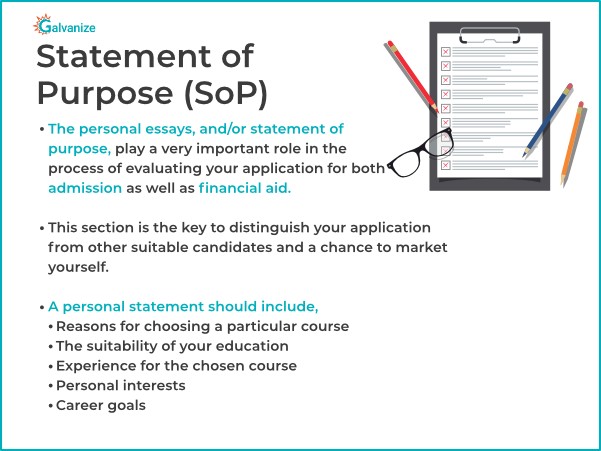
How do you do this?
You can do this by saying that you are the kind of person who can focus and work very well on topics that you’re passionate about, and it’s hard for you to focus on something that you aren’t fundamentally committed to.
You can explain that your GPA is low but in all the subjects related to your target area of specialization, you’ve done extremely well and that’s the kind of person you are.
So whatever exam you might have given i.e., GRE or TOEFL or IELTS, your Statement of purpose will make you stand out from other applicants.

Generally, the main difference in writing a statement of purpose for MS and Ph.D. is in the way you present yourself especially with regards to research.
In an SOP for a Ph.D application, you need to talk more about your research, your research group and your contribution to the group. Here you can talk about the professor who inspired you and your experience with him. The reader of your statement of purpose will be more interested to know about the analytical skills you acquired which are critical for research in Ph.D programs. Talk about your thesis and the work that went into it.
Whereas in the statement of purpose for a Masters, your focus is on developing your skills through said Master’s program, not necessarily in creating new things/developing new knowledge through research. Talk about situations that highlight your good leadership and communication skills. Focus on writing about your goals, programs that will help in your career while writing an SOP for Masters.
The statement of purpose is the only essay where you get the chance to write about yourself and make a difference from other applicants. The admission counselling can get an analysis of your background and how passionate you are to get an admit to the university.
With a well-written statement of purpose, you can underplay your weaknesses and convince the committee to get the admission. This becomes easier when you understand the audience of your statement of purpose (admissions committee).
An SOP is also a place where you can highlight your strengths and skills necessary for your academic and career excellence. It is very important for you to put your heart and passion for the program while writing a statement of purpose.
Let’s look at it in a little more detail. For somebody who is in their undergrad, when you’re applying to universities, this is a template that we might recommend for you.
We’re not necessarily saying that everybody should stick to this template but unless you have very specific reasons or a strong narrative that you want to weave indifferently, this is a good tried and tested statement of purpose template to follow.
First, you give a brief introduction of yourself and talk about your high school and undergraduate work and how they prepared you.
Next, the middle paragraph is important and this is where we’ll discuss your specialization and then you can further describe any other projects that you did in the specialization that you would like to target.
Finally, you talk about why you chose this particular university and why this particular program in that university and what you plan to do after you graduate from there.
This is a good, safe way to organize your statement of purpose.
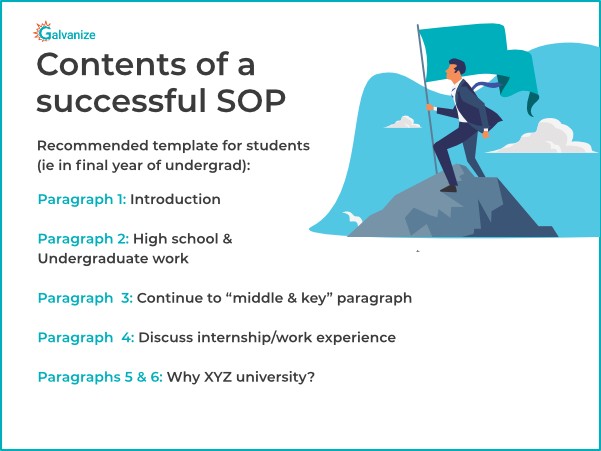
Keep in mind to keep it tight as you will realize writing these things down takes time because it requires you to think deeply and to introspect so we recommend starting early.
Don’t wait until the last minute and start writing your statement of purpose in November.
Start well in advance so you have a first draft, a second draft, and additional edits if needed. These are the things you want to start thinking about right away.
Starting with the introduction, you have to be clear and state what specialization you want to pursue. Make sure that you tell the truth, do not makeup stories, and avoid being sentimental.
Get ideas on how to write an SOP with the following statement of purpose format outlined below.
Let us take a look at a bad introduction paragraph next so you know what we’re talking about and what to avoid.
Look the following statement of purpose format for the introduction paragraph and continue with suggestions mentioned below for writing a better introduction.
“Growing up, I always loved math and sciences. I was that weird kid that liked calculus and algebra, and I thought that chemistry was fun. And because I excelled in those things, my parents always told me: “Anita, the best way to use those interests and apply them to a career is to become an engineer.” After three years of undergraduate Computer Science Engineering, I realized that my parents were wrong in shaping my calling. Suddenly one day after seeing blue cabbage turning red in lemon sauce, I realized that it was Chemistry rather than Coding that was my calling and life-long desire.”
“Growing up, I always loved math and sciences” – fine, fair enough. “I was that weird kid that liked calculus and algebra” – the usage of the words “weird kid” makes this unnecessarily sentimental.
It goes on to say “because I excelled in those things, my parents always told me: “Anita, the best way to use those interests and apply them to a career, is to become an engineer.”
Well, this sounds like a made-up anecdote, even if it’s true, it might very well be true. But it’s unnecessarily sentimental in the statement of purpose and it also shows that you’re influenced by what your parents say that you haven’t really thought about how to use these interests.
This person then goes on to say, “After three years of undergraduate Computer Science Engineering, I realized that my parents were wrong in shaping my calling.”

This is also unnecessary because it seems like you’re dissing your parents. It’s important to just be professional and talk about yourself, your decisions to make a perfect statement of purpose.
Moving further, we see this reads “ Suddenly one day after seeing blue cabbage turning red in lemon sauce, I realized that it was Chemistry rather than Coding that was my calling and life-long desire.”
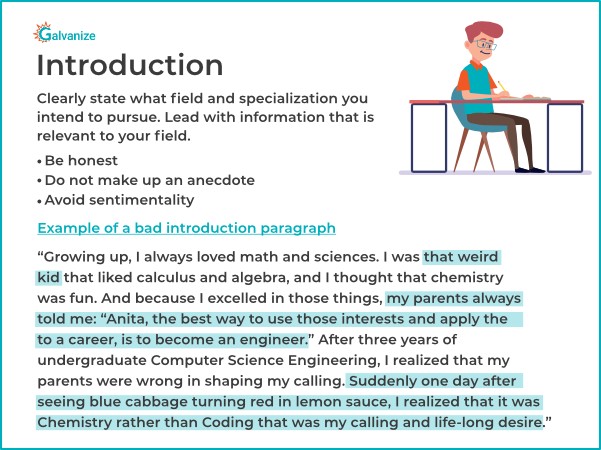
The issue with this is it just doesn’t sound believable – it might actually be true. But that this one moment just changed your life seems a little hard to believe. You would have had multiple opportunities in chemistry lab in high school to see compounds change color & producing colorful spangles – how come your passion for chemistry wasn’t kick-started then?
It just doesn’t sound believable – you want to make sure that what you write sounds credible, that it sounds professional and that is how you know your writing is going to be believed. Put yourself in their shoes, imagine you are reading this – what will you think about the person who’s writing this?
We hope this gives you some concrete ideas about what to do and what to avoid so make sure that you’re honest. Are the professors likely to believe in this sudden serendipitous moment?
You want to talk about your wishes in your career, how your decisions were shaped because once you do your Master’s, it’s all about you.
It’s nice to respect your parents but professors want to know what you are going to because you’re the one who’s going to sit there, take the classes with them and answer the tests – not your parents.
A good reference for a personal statement we think is called “Matters of Form” – they talk about how to begin a nice introductory paragraph for those of you that are interested.
Let’s move on to the middle part of your statement of purpose – you have to talk about how you evolved as an undergraduate student, what courses you took, which ones you really liked, based on that which electives you decided to take.
You can further strengthen your knowledge in that direction. Your project work, your thesis, any paper presentations you may have done, what research you did etc and how you would like to extend this work in the future.
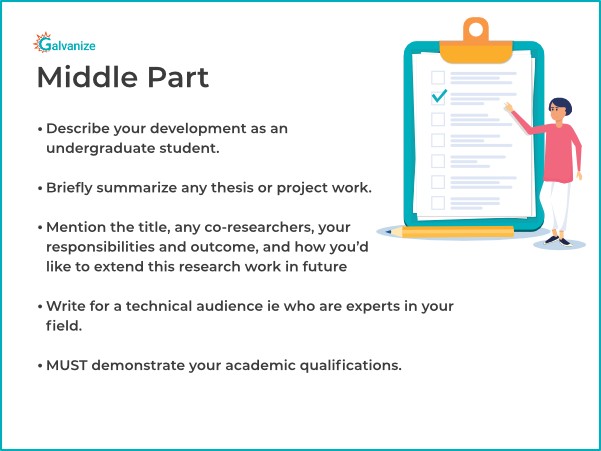
Make sure that you are writing not for a lay-person. You’re writing it for a technical audience, somebody who’s already an expert in this field. So you can use technical terms in your personal statement but don’t drop them unnecessarily. Identify and use them in relevant places.
Let’s now see an SOP format with a good ‘middle paragraph’ – this is from a mechanical engineering undergrad student who also wants to specialize in mechanical engineering, particularly in energy.
You can see it’s very clear that the student understands what the project is and why they chose this. “G iven the growing realization of the need for low-emission power sources and alternatives for fossil fuels.”
It’s clear that the person who’s writing this cares about the environment, they care about renewable energy and that’s why they have chosen a project that is relevant.
“In lieu of a formal introduction of my academic interests, I would like to offer a summary of the design project I did for the award of my Bachelor’s degree in Engineering.”
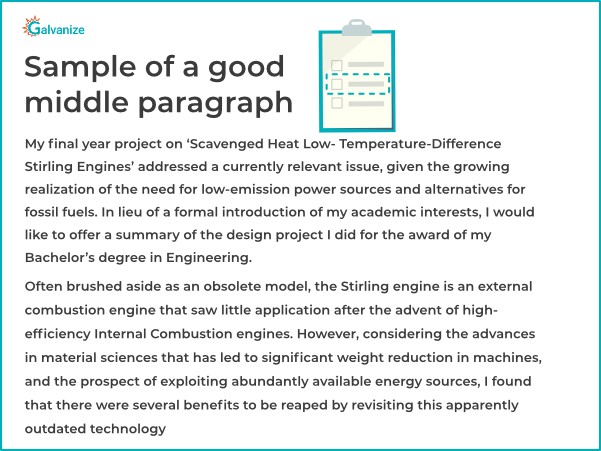
Note how beautifully the student has weaved in the fact that their project was chosen as an award-winning project in design in their class.
They then move on to talk more about the project – “Often brushed aside as an obsolete model, the Stirling engine is an external combustion engine that saw little application after the advent of high-efficiency Internal Combustion engines. However, considering the advances in material sciences that has led to significant weight reduction in machines, and the prospect of exploiting abundantly available energy sources, I found that there were several benefits to be reaped by revisiting this apparently outdated technology.”
So the student is explaining certain recent advances as well as the importance of exploiting whatever energy sources that you have a good way in the statement of purpose. The student is saying, ‘let me revisit this apparently outdated technology’.
The student is also giving the reader an inside look into their thought process. Do they just go by what people say or do they put two and two together and say ‘I think this is worth revisiting’? The student here also demonstrated that they believe in taking risks.
They’re saying ‘look, I know it was considered obsolete but things have changed in a couple of areas and I do think it’s worth revisiting so I’m going to put my time and energy into this’.
They’re not just diving in, it’s a carefully weighted risk, they’ve explained their rationale and thought process so you can already get a feel for how this person thinks, what they’re passionate about and how they will take decisions.
This is the kind of information that somebody will glean after reading a paragraph like this.
Continuing, “While not as efficient as the Internal Combustion engine, the LTD Stirling engines nevertheless have a potential to be used in auxiliary small-scale applications that can derive input energy from the heat that is otherwise unused”
You can see that this person is clearly writing for a technical expert on and also demonstrating knowledge of this product . So yes, ‘I know the pros and cons but I am going to limit my work within its scope and I know I think that there can be some value to be gained from exploring more in this area.’
“This project not only shed light on a less explored area of design, but also taught me valuable lessons on high-efficiency, compact designing and the nuances in material selection, keeping in mind the value of the end product. It also earned me an internship at the R&D section of Ashok Leyland Automobile Company, Bengaluru, where I had an opportunity to witness the extensive research done in emission control.”
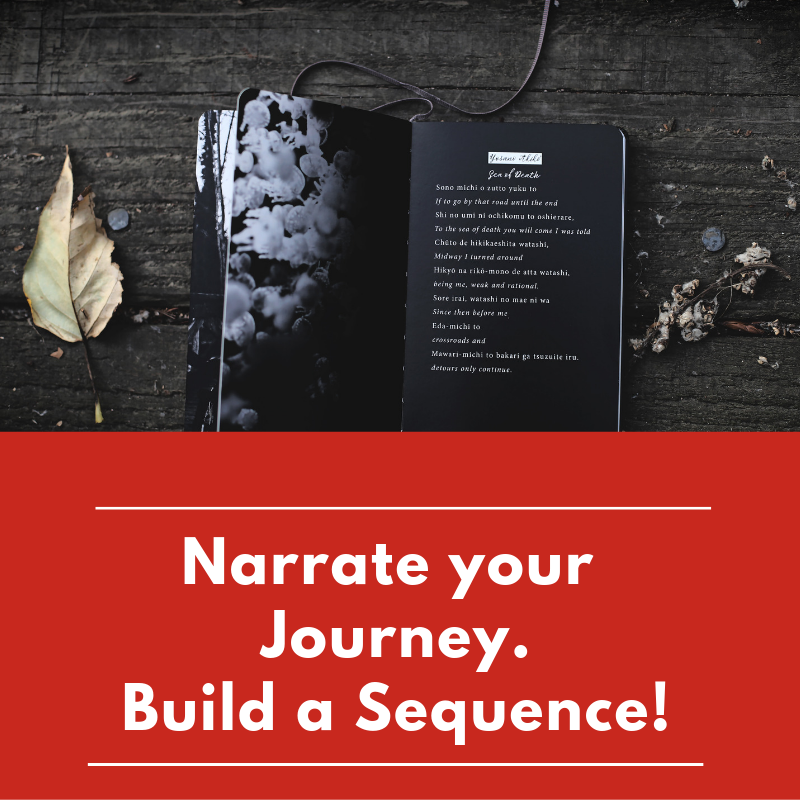
You can see how the narrative he’s laying out takes you on a journey from step one to two step to step three and it’s building that sequence so he can drive his story in.
Let’s read further – ‘Having developed an interest in renewable energy sources very early in my academic career, I would like to continue exploring avenues for further research following the positive results I gained from my project, focusing on improving the efficiency of the engine and expanding its scope of application’.
So the student is very clear about their interests, they’re saying ‘hey look I’m interested in renewable energy sources and would like to continue exploring this for further research, this is what I want to work on to go about about improving its efficiency, expanding its scope of application.
Like we mentioned earlier today, talking about the next steps that you would like to take is important and that’s what he has done here. That’s also addressed here.